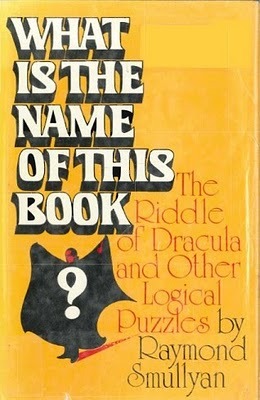Seth's Reviews > What Is the Name of This Book?
What Is the Name of This Book?
by

by

Seth's review
bookshelves: psychology, masterpieces, books-that-built-me, needs-cover, reference, books-that-make-you-smarter
Apr 18, 2007
bookshelves: psychology, masterpieces, books-that-built-me, needs-cover, reference, books-that-make-you-smarter
Let's get the simple stuff out of the way: Yes, this is largely a book of Smullyan's well-known Knights and Knaves puzzles. However, it has a lot more.
Beginning and ending sections include jokes about logic and logicians that teach a huge amount about logic itself. A section in the back teaches about Godel's Theorem in a simple way anyone can understand (perhaps more elegantly than Hoftadter did, perhaps not). He gives a feeling for what logic is and why we understand it the way we do.
But back to the main thing: the puzzles. First, not all are Knights/Knaves. He has some (slightly silly) puzzles of other varieties (such as the title puzzle: what is the name of the book, after all?).
The Knights and Knaves puzzles are followed by other truth/not-truth variants. In increasing difficulty we get people who can lie or not, people who are insane and think true is false and false is true, people whose tendency to lie changes by the day of the week (which is something always unknown, of course) and take side trips into caskets with truth or lies on them and other variants.
The important piece there is "in increasing difficulty." This book is a disguised master course in boolean logic. Repeatedly, a puzzle will step back and ask you to solve a general case, without knowing exactly what situation it will be applied to.
By the end of the main puzzle section, we come to the actual Riddle of Dracula, which presents the problem of writing one solution that works for every puzzle up until then, across several chapters of the book. Smullyan isn't teaching how to solve a puzzle, he's teaching how the system of these puzzles works.
In the later chapters he discusses this openly and (lightly) applies the same principles to other varieties of puzzles, whch leads into his discussion of Goedel. That turns this book into a class not just on Boolean logic, but on the learning and the synthesis that form the basis of all science.
And it's incredibly funny along the way.
Beginning and ending sections include jokes about logic and logicians that teach a huge amount about logic itself. A section in the back teaches about Godel's Theorem in a simple way anyone can understand (perhaps more elegantly than Hoftadter did, perhaps not). He gives a feeling for what logic is and why we understand it the way we do.
But back to the main thing: the puzzles. First, not all are Knights/Knaves. He has some (slightly silly) puzzles of other varieties (such as the title puzzle: what is the name of the book, after all?).
The Knights and Knaves puzzles are followed by other truth/not-truth variants. In increasing difficulty we get people who can lie or not, people who are insane and think true is false and false is true, people whose tendency to lie changes by the day of the week (which is something always unknown, of course) and take side trips into caskets with truth or lies on them and other variants.
The important piece there is "in increasing difficulty." This book is a disguised master course in boolean logic. Repeatedly, a puzzle will step back and ask you to solve a general case, without knowing exactly what situation it will be applied to.
By the end of the main puzzle section, we come to the actual Riddle of Dracula, which presents the problem of writing one solution that works for every puzzle up until then, across several chapters of the book. Smullyan isn't teaching how to solve a puzzle, he's teaching how the system of these puzzles works.
In the later chapters he discusses this openly and (lightly) applies the same principles to other varieties of puzzles, whch leads into his discussion of Goedel. That turns this book into a class not just on Boolean logic, but on the learning and the synthesis that form the basis of all science.
And it's incredibly funny along the way.
Sign into Goodreads to see if any of your friends have read
What Is the Name of This Book?.
Sign In »
Reading Progress
Started Reading
January 1, 1983
–
Finished Reading
April 18, 2007
– Shelved
August 16, 2007
– Shelved as:
psychology
August 16, 2007
– Shelved as:
masterpieces
August 16, 2007
– Shelved as:
books-that-built-me
August 26, 2007
– Shelved as:
needs-cover
September 19, 2007
– Shelved as:
reference
September 29, 2007
– Shelved as:
books-that-make-you-smarter


